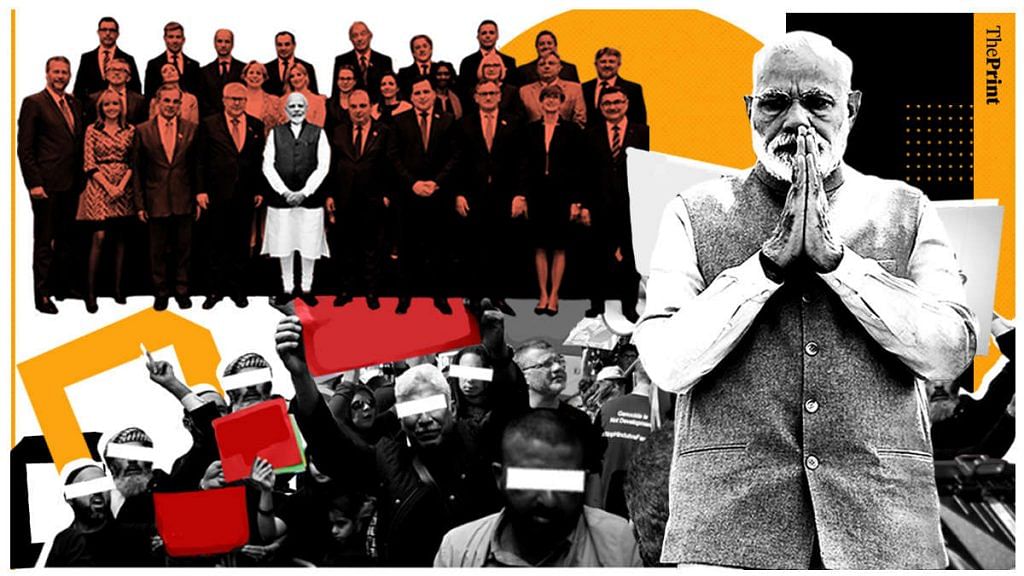The Narendra Modi government’s diplomatic team in New Delhi deserves all praise for successfully handling the issue of the anti-Citizenship Amendment Act resolution in the European Parliament. The much-needed breather comes after the European Parliament, which has 751 members, decided to postpone the voting on the motion against Modi government’s citizenship law that was moved by Pakistan-born British member Shaffaq Mohammed.
The European Parliament, which meets once a month for four days, is unlikely to vote on the resolution even in March, when the motion is next scheduled to come up. But the Indian contingent and the diplomatic channels will have to work overtime to get the resolution dumped by the European Parliament once and for all.
Members of the European Parliament (MEPs) are well within their right to discuss and debate nation-specific issues that have bearings on larger issues like refugee problems, human rights violations and other subjects of global importance. But it is strange that issues like the inhuman treatment of Uyghur Muslims in China and the presence of reformation camps, a euphemism for concentration camps, are not considered worthy of discussion by Shaffaq Mohammed, one of the 81 outgoing MEPs.
Also read: Modi critics decry India mistreating minorities but mustn’t whitewash Pakistan’s Islamisation
Dialogue before debate
Piloting the debate, European Commission vice-president Helena Dalli is reported to have demolished the illogical resolution. She emphasised on the “rich, frank and open” relationship between India and the European Union (EU). She also referred to the Supreme Court of India, which is already seized of the legality of the Citizenship Amendment Act (CAA) that the Modi government has very rightly held as an internal matter of India.
Dalli, a votary of equality and inclusion, and committed to protecting the ‘European way of life’, has a special concern for marginalised minority communities. Her concern for the nearly 11 million-strong Roma minority in Europe is well-known. The secretariat of the foreign office in New Delhi would do well to brief her and other members of her team on the persecution of minorities in Pakistan and elsewhere in the region. Such an effort will go a long way to educate the members of the European Parliament on the reality of the situation that compelled the Modi government to enact the CAA.
New Delhi will be helped by the fact that the EU has decided to “pursue and intensify” dialogue with India, calling it a “respected democracy” and a valued partner of the 28-nation bloc.
Also read: Modi used to be toast of the world, now his ministers are damaging Brand India by lashing out
Modi and India’s economic strength
The EU is eagerly waiting for Prime Minister Narendra Modi’s proposed visit to Brussels in March for the India-European Union Summit. Naturally, the EU would not like to upset the possibilities of trade opportunities and economic benefits by shooting in its own foot because of an utterly illogical and unenforceable resolution on a matter that the EU has absolutely no jurisdiction.
Negotiations are on since 2007 between India and the EU for a comprehensive Free Trade Agreement (FTA). The EU FTA talks went on a slow track in 2013, but have resumed in recent times with a renewed commitment to finalise an ambitious, comprehensive and balanced agreement.
Given its free-market thinking and proclivity to deal with democratic dispensations, the EU would prefer to work towards a trade architecture that is open, non-discriminatory and has a well-structured regulatory and industrial environment for European companies trading with or investing in India. Such a demand places India on a priority list far ahead of China.
The EU is India’s largest trading partner, accounting for nearly £92 billion worth of trade in goods in 2018 or 12.9 per cent of total Indian trade, ahead of China (10.9 per cent) and the US (10.1 per cent). One of the reasons behind Pakistan’s over enthusiasm in bringing a resolution against the CAA could be China’s covert support, which is an important element in how Beijing conducts trade with the rest of the world.
It is no secret that China and Pakistan have repeatedly come together to propose a resolution in the United Nations Security Council (UNSC) against the scrapping of Jammu and Kashmir’s special status under Article 370, yet another internal issue of India. Both China and Pakistan would like to wreck all corridors of India’s trade with the EU and other developed economies.
Also read: European Union is ‘keener’ to seal trade pacts with India than discuss Kashmir & CAA
India, an investment hub
Over the last decade, the EU’s share in India’s foreign investment inflows has increased to 18 per cent from 8 per cent, with more than 6,000 companies making a beeline to India, providing more than a million jobs. Notwithstanding this interest in India, the EU’s foreign direct investment (FDI) in the country’s share market is only about £70 billion compared to about twice the amount (£178 billion) in Chinese stock market.
Needless to say, the Modi government should be worried about the faulty international trade parameters and understand the key differences between the political and economic Europe.
One of the key mechanisms related to trade between India and the EU is the EU-India Trade Sub-Commission, established under the 1994 Cooperation and Partnership Agreement. Besides, a number of technical working groups have been established to examine a broad range of trade-related issues.
New Delhi should remember that every foreign investor, especially from the EU-member countries, worries about the protection of their investments and intellectual property. Needless to say, the finance and commerce ministries must resolve issues relating to technical and non-technical trade barriers bordering on discriminative policy initiatives in order to unlock the untapped potential of two-way trade between the EU and India.
The author is a member of the National Executive Committee of the BJP and former editor of Organiser. Views are personal.
